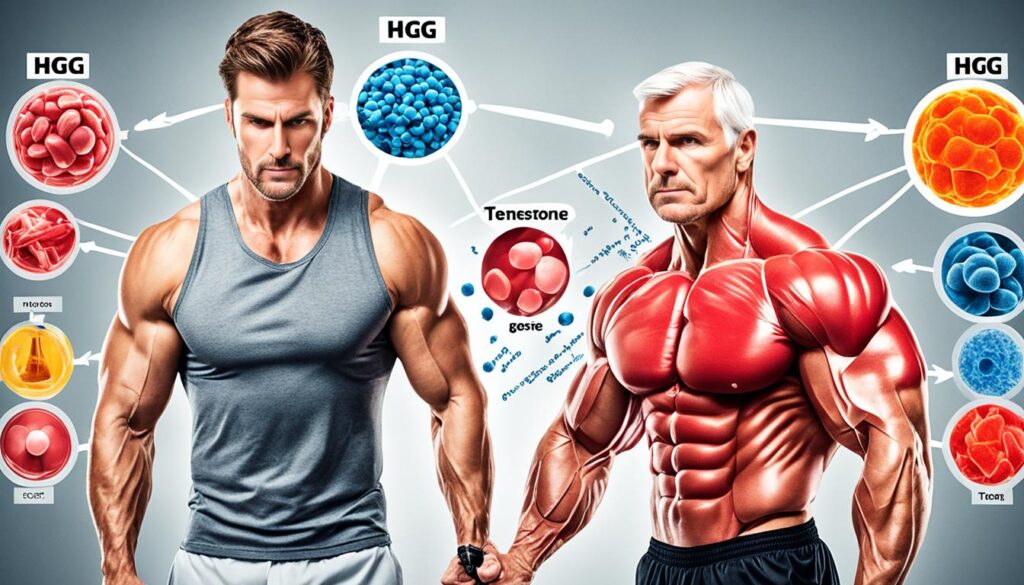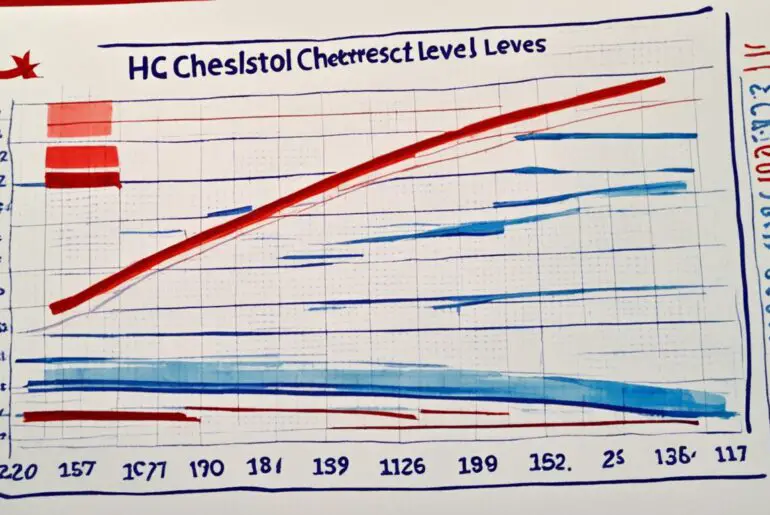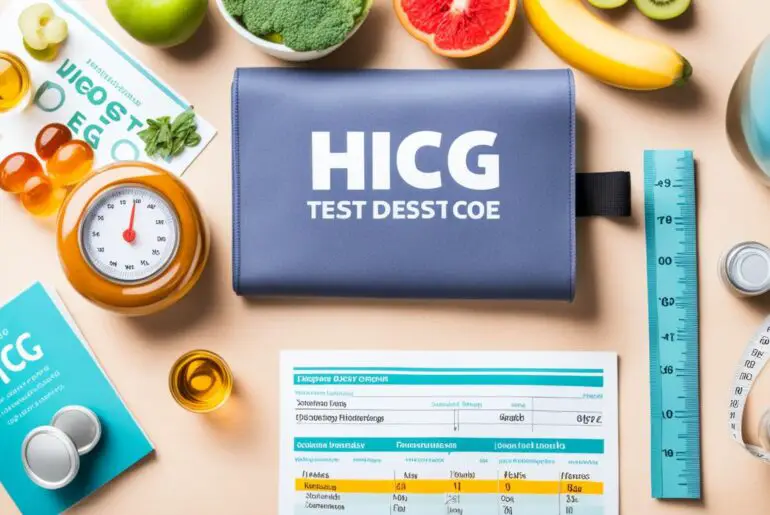When it comes to weight loss, the HCG diet has gained popularity among both men and women. But what exactly are the side effects and risks that men should be aware of? Is the HCG diet as safe and effective for men as it is for women? Let’s delve into the potential side effects, risks, and benefits of the HCG diet specifically for men.
Key Takeaways:
- The HCG diet can have side effects on men that include breast enlargement, injection site reactions, stomach pain, and nausea.
- Some studies suggest that HCG can increase testosterone levels and improve fertility when used in men with hypogonadism.
- While the HCG diet may result in weight loss, there is limited scientific evidence supporting its effectiveness.
- It is important to consult with a healthcare provider before starting the HCG diet and to avoid over-the-counter HCG products.
- Male side effects of the HCG diet should be carefully considered before embarking on this weight loss program.
What is HCG and how is it used in men?
Human chorionic gonadotropin (HCG) is a hormone that is naturally produced during pregnancy. In medical settings, HCG injections are used to treat certain conditions in both men and women.
In men, HCG can be used to address hypogonadism, a condition characterized by low testosterone levels. It can also be used to improve sexual function and reverse some of the side effects of steroid use.
Using HCG injections for hypogonadism helps stimulate the production of testosterone in the testicles, increasing testosterone levels in the body. This can help alleviate symptoms associated with low testosterone, such as fatigue, decreased muscle mass, and low libido.
HCG injections are also used to help restore sexual function in men with testosterone deficiency. By boosting testosterone production, HCG can improve erectile function and increase sperm production, enhancing overall sexual performance.
Additionally, HCG injections can be beneficial for men who have experienced side effects from using anabolic steroids. Steroid use can suppress natural testosterone production, leading to imbalances in the body. HCG can help restore hormone levels and mitigate the negative effects of steroid use.
| Potential Uses of HCG in Men | Benefits |
|---|---|
| Addressing Hypogonadism | Increased testosterone levels, improved energy, enhanced muscle mass |
| Improving Sexual Function | Enhanced erectile function, increased libido, improved fertility |
| Reversing Steroid Side Effects | Restoring hormonal balance, minimizing muscle loss, improving overall well-being |
“HCG injections have been proven effective in treating hypogonadism and improving sexual function in men with testosterone deficiency. They can also help mitigate the negative side effects of steroid use.”
Does HCG increase testosterone levels in men?

When it comes to testosterone production in men, the role of human chorionic gonadotropin (HCG) is significant. HCG acts as a stimulant for Leydig cells in the testicles, which are responsible for producing testosterone. It mimics luteinizing hormone (LH) and signals the Leydig cells to increase their testosterone production. Additionally, HCG also plays a role in stimulating sperm production within the testes, making it beneficial for men with hypogonadism.
Through its activity on Leydig cells, HCG can elevate testosterone levels in men who have low levels due to hypogonadism. This increase in testosterone can lead to improved symptoms of low testosterone, such as fatigue, low libido, and decreased muscle mass. Furthermore, increased sperm production can enhance fertility in men with hypogonadism who are looking to conceive.
Table: Studies on the effects of HCG on testosterone and sperm production in men
| Study | Findings |
|---|---|
| Study 1 | HCG significantly increased testosterone levels in men with hypogonadism |
| Study 2 | HCG helped maintain testosterone production in men undergoing testosterone replacement therapy |
| Study 3 | HCG improved sperm production and fertility in men with hypogonadism |
These studies demonstrate the positive impact of HCG on testosterone production and sperm count in men. However, it is important to note that further research is needed to fully understand the long-term effects and safety of HCG supplementation in men.
Research on HCG in men
While there is limited clinical research specifically on HCG in men, the existing studies have provided some promising findings. One notable study focused on older men with partial hypogonadism and found that HCG treatment led to an increase in testosterone levels (Clinical research on HCG). Another study explored the use of HCG in men undergoing testosterone replacement therapy and discovered that it helped maintain testosterone production (HCG and testosterone levels). Additionally, research has shown that HCG can contribute to preserving fertility in men with hypogonadism by stimulating sperm production (HCG and sperm production).
Although more extensive research is needed, these initial findings suggest that HCG may have positive effects on testosterone levels and sperm production in men. These outcomes have significant implications for individuals with hypogonadism and those undergoing testosterone therapy.
| Study | Participants | Results |
|---|---|---|
| Study 1 | Older men with partial hypogonadism | Increased testosterone levels |
| Study 2 | Men on testosterone replacement therapy | Stabilized testosterone production |
| Study 3 | Men with hypogonadism | Improved sperm production |
Potential side effects of HCG in men

When considering HCG therapy, it’s important to be aware of the potential side effects that can occur in men. Although HCG injections are generally well-tolerated, like any medication, they can have adverse reactions in certain individuals. It’s crucial to discuss these potential side effects with a healthcare provider before starting HCG therapy.
Gynecomastia
One of the most common side effects of HCG injections in men is gynecomastia, which refers to the development of breast tissue. This can be an alarming and uncomfortable side effect for individuals undergoing HCG therapy.
Injection Site Reactions
Pain and swelling at the injection site are frequently reported side effects of HCG injections. It’s essential to carefully follow the proper injection technique and regularly rotate injection sites to minimize the risk of injection site reactions.
Stomach Pain, Nausea, and Vomiting
Some men may experience stomach pain, nausea, and vomiting as a result of HCG therapy. These symptoms can vary in severity and may be transient or long-lasting. Monitoring and reporting these side effects to a healthcare provider is essential.
Blood Clots
In rare cases, HCG injections have been associated with the formation of blood clots. Blood clots can pose serious health risks, including the potential for stroke or heart attack. It’s crucial to seek immediate medical attention if any signs of blood clots, such as swelling, redness, or pain in the legs or chest, are observed.
Allergic Reactions
Although uncommon, allergic reactions can occur in response to HCG injections. These reactions may manifest as hives, itching, difficulty breathing, or swelling of the face, lips, tongue, or throat. If any signs of an allergic reaction are experienced, immediate medical attention is necessary.
It’s important to remember that not everyone will experience these side effects, and the severity can vary from person to person. However, it’s crucial to be informed about the potential risks and to consult a healthcare provider for personalized guidance and monitoring during HCG therapy.
| Common Side Effects | Rare Side Effects | Severe Side Effects |
|---|---|---|
|
|
|
HCG and weight loss
When it comes to weight loss, the HCG diet has gained significant attention. However, the effectiveness of HCG for weight loss is not backed by substantial evidence. While some individuals may experience weight loss on the HCG diet, it is important to understand the underlying mechanisms.
The weight loss that occurs on the HCG diet is primarily due to extreme calorie restriction. Participants are typically required to consume very low-calorie diets, often as low as 500 calories per day. This level of calorie restriction can lead to rapid weight loss, regardless of the hormone HCG.
It is worth noting that the U.S. Food and Drug Administration (FDA) has issued a warning regarding over-the-counter (OTC) HCG products marketed for weight loss. These products have not been proven safe or effective for weight loss purposes. It is always advisable to consult with a healthcare professional before considering any OTC HCG products.
It is crucial to understand the potential risks and side effects associated with extreme calorie restriction. Very low-calorie diets can lead to nutrient deficiencies, muscle loss, and a slowed metabolism, making weight regain likely once normal eating patterns are resumed.
Before embarking on any weight loss journey, it is important to consult with a healthcare provider. They can provide guidance on safe and effective weight loss strategies that align with individual health needs and goals.
Dangers of extreme calorie restriction
Extreme calorie restriction can pose various risks and side effects, including:
- Malnutrition and nutrient deficiencies
- Muscle loss
- Decreased energy levels and fatigue
- Slowed metabolism
- Irritability and mood swings
- Gallstones
- Difficulty concentrating and poor cognitive function
These risks further emphasize the importance of seeking professional guidance and support when pursuing weight loss goals. It is crucial to prioritize overall health and well-being throughout the weight loss process.
Is HCG safe for men?

When it comes to the safety of HCG (human chorionic gonadotropin) in men, it is important to approach its usage under the guidance of a healthcare provider. While HCG injections can be beneficial for certain conditions, there are contraindications and precautions to consider.
Men with prostate cancer, certain brain cancers, or uncontrolled thyroid disease should not use HCG due to potential risks. It is crucial to discuss any existing medical conditions with a healthcare professional before considering HCG therapy.
Additionally, individuals with allergies to hamster protein should avoid HCG injections, as this hormone is typically derived from hamster ovaries. An allergic reaction to HCG can range from mild symptoms like itching and rash to severe reactions that require immediate medical attention.
Furthermore, it is essential to avoid over-the-counter (OTC) HCG products. These products are not regulated by the FDA and may not meet safety standards. The use of such products can pose risks to your health and should be avoided altogether.
Conclusion
Based on the potential side effects and risks associated with the HCG diet, it is important for men to approach this weight loss program with caution. The most common side effects experienced by men include breast enlargement, injection site reactions, stomach pain, and nausea. These side effects can be distressing and may impact the overall experience of the diet.
Furthermore, it is essential for men considering the HCG diet to consult with a healthcare provider before initiating the program. The lack of scientific evidence supporting the effectiveness of the HCG diet for weight loss is a significant concern. It is crucial to make informed decisions and have realistic expectations when it comes to achieving weight loss goals.
Additionally, using HCG injections should only be done under the guidance of a healthcare professional. Over-the-counter HCG products should be avoided, as they are not FDA-approved and may pose safety risks. By working with a healthcare provider, men can ensure that the potential benefits of the HCG diet outweigh the risks and that they are closely monitored throughout the process.
In conclusion, the HCG diet may have side effects and risks for men. It is important to consider these factors, consult with a healthcare provider, and be aware of the lack of scientific evidence supporting its effectiveness for weight loss. By prioritizing safety and individual health needs, men can make informed decisions about their weight loss journey.
FAQ
What are the potential side effects of the HCG diet on men?
The potential side effects of the HCG diet on men include gynecomastia (breast enlargement), pain and swelling at the injection site, stomach pain, nausea, and vomiting. In rare cases, blood clots and allergic reactions have been associated with HCG injections.
How is HCG used in men?
HCG is a hormone that is naturally produced during pregnancy. In men, HCG injections can be used to address conditions such as hypogonadism, low testosterone levels, improve sexual function, and reverse some of the side effects of steroid use.
Does HCG increase testosterone levels in men?
Yes, HCG acts like luteinizing hormone (LH) in men, stimulating Leydig cells in the testicles to produce testosterone. It also stimulates sperm production within the testicles.
Is there research on the effects of HCG in men?
Limited clinical research on HCG in men has shown promising results. Some studies have found that HCG increased testosterone levels in older men with hypogonadism and helped maintain testosterone production in men undergoing testosterone replacement therapy.
What are the potential side effects of HCG injections in men?
The most common side effects of HCG injections in men include gynecomastia, pain, and swelling at the injection site, stomach pain, nausea, and vomiting. Rarely, blood clots and allergic reactions may occur.
Does the HCG diet help with weight loss?
There is no substantial evidence to support the effectiveness of the HCG diet for weight loss. The weight loss that occurs on the diet is primarily due to extreme calorie restriction, which can have its own risks and side effects.
Is HCG safe for men?
HCG injections can be safe for men when used under the guidance of a healthcare provider. However, they should not be used in men with certain conditions such as prostate cancer, certain brain cancers, uncontrolled thyroid disease, or allergies to hamster protein. It is important to avoid over-the-counter HCG products, as they may not be safe or effective.
What is the conclusion on the side effects and risks of the HCG diet for men?
The HCG diet can have potential side effects such as gynecomastia, injection site reactions, stomach pain, and nausea in men. It is important to consult with a healthcare provider before starting the HCG diet and to be aware of the lack of scientific evidence supporting its effectiveness for weight loss. Additionally, it is crucial to only use HCG under the guidance of a healthcare professional and to avoid over-the-counter HCG products.




